小学六年级英语语法 冠词精PPT课件
英语冠词完整版本课件ppt
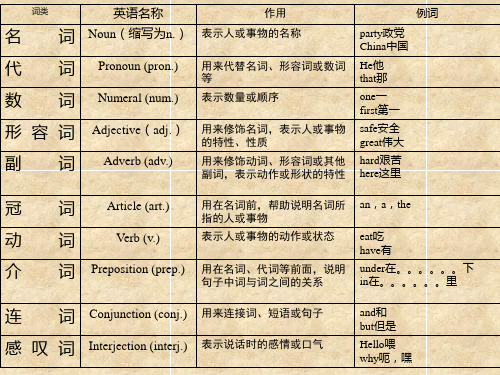
(2)Jumping out of ______airplane at ten thousand feet is quite ______exciting experience. (2002全国) A. 不填; the B. 不填; an C. an; an D. the; the 解析:前者指处于一万英尺高的“任何一驾飞机”,用不定冠词;后者指“一次令人激动的经历”,也用不定冠词。答案是C。 (3)In ______ review of 44 studies, American researchers found that men and women who ate six key foods daily cut the risk of ______heart disease by 76%. (2006湖南) A. a; the B. the; a C. a; 不填 D. 不填; a 解析:表示“一项调查”,用不定冠词a;heart disease前通常不用冠词。答案是C。
(2)Don’t worry if you can’t come to ______ party. ——I’ll save ______ cake for you. (2006浙江) A. the; some B. a; much C. the; any D. a; little 解析:前面的party是特指双方心目中都知道的那个晚会,用the,排除B和D;因在肯定句中,用而不用,排除C。答案是A。
二、不定冠词的主要用法
1. 不定冠词用在单数可数名词前,表示泛指某类人或事物中的一个或任一个,意为“一个/位/座/项/段/次……”。 【真题再现】(1)The Wilsons live in _____A-shaped house near the coast. It is _____17th century cottage. (2004浙江) A. the , / B. an, the C. /, the D. an, a 解析:两者都是指某类事物中的一个。句意是:威尔逊一家住在海岸附近的一座A形的房子里;那是一座17世纪时建的别墅。答案是D。
通用版小学英语六年级下册期末语法总复习—不定冠词、定冠词课件
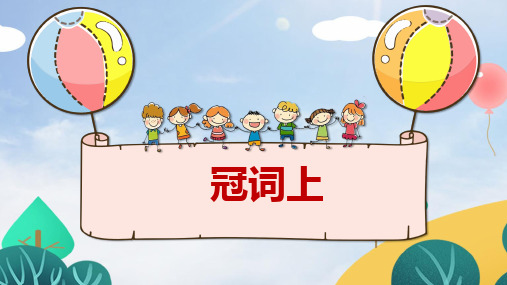
音音素前 an 元音音素前
a university an umbrella
元音字母:A E I O U
a
an
a cat orange
a dog apple
a book egg
a
an
NBA player 一位美国篮球球员 a VIP 一位贵宾 a UFO 一个不明飞行物
an用于哪些单独字母前
f
d
冠词上
It is a lovely panda. ✔ It is lovely panda.
冠词+名词
概念
冠词:表示一类人或事物。
冠词分类
1 不定冠词 a/an 表泛指
a dog
2 定冠词 the 表特指 the dog
3 零冠词 不用冠词 have dinner
a/an的区分
不定冠词a、an
四字真言:独乐序形
用法: 用在表示世界上独一无二事物的名词前。
the XXX the earth the moon the world
共同点是什么?
用法: 用在表示西洋乐器的名词前。
判断
✔ play the piano ✘ play the basketball ✔ play erhu ✔ play the erhu
A. useful book B. umbrella C. university D. uniform E. ugly boy
隔山打牛
our onest girl
orse ouse
h不发音,后面发元音用an
an + hour/honest
theater opera NBA player
message postcard ice cream
六年级下册英语课件小升初英语专题精讲冠词定冠词全国通用
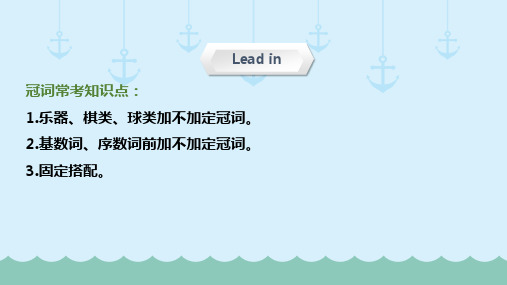
是一个,第二个空格表示上文提到的map再次提到用the,第三个空是
固定搭配on the wall。故选A。
Practice
选择填空。
( C)12.Would you please pass me __t_h_e__ sugar on _t_h__e_ table?源自A.a;/B.an;a
C.the;the
太阳比月亮大。 The sun is bigger than the moon. 我打算去参观长城。
I am going to visit the Great Wall.
Language points
定冠词的用法: (6)用在形容词前表示一类人。例如:
the poor 穷人们 the old 老人们
Practice
选择填空。
( B)11.There is____a___map of China,_t_h__e_map is on__t_h_e_wall.
A.the;the;the B.a;the;the
C.a;a;the
D./;a;the
解析:句意:有一张中国的地图,这张地图是在墙上。第一个空格指的
搭配in bed,中间不加任何冠词。而表示在“浴室中”则必须加上定冠
词the,故选D。
选择填空。
Practice
( A)3.Mary liks music,but she doesn't like ___t_h_e__ music of
that film.
A. the
B. a
C. some
D. /
Language points
定冠词的用法: (7)用在姓氏前表示一家人。例如:
格林一家人在吃饭。 The Greens are at table. 布莱克一家人现在住在伦敦。 The Blacks are living in London now.
小学英语语法课件-冠词课件

Par0t13、回顾中小学生守则
定冠词 目 录
02、学生日常行为规范
CONTENTS
03、班级纪律公约
t0h4e、校内外安全须知
定冠词
定冠词 the 用于各种名词前面, 目的是对名词做个记号,表“特指”。 在词汇表中意思解释为: “这个,那个,这些,那些”。 所以+ 可数/不可数单数复数都可以。
去旅行 总之 看一看 休息一下 玩的开心
不定冠词用法小结
1.表示数量“一”。( 但数的概念没有“one”强烈。) 2.用于第一次提到的人或事物的名词前。 3.指某人或某物,但不具体指明哪个人或物。 4.表示类别,泛指一类人或物。(a 和an 不必翻译) 5. 用于固定搭配中。
不定冠词a/an的区别 a 放在辅音音素开头的名词前面; an 放在元音音素开头的名词前面。
定冠词的用法小结
1.用来特指某些人或事物,这是定冠词的基本用法。 2.用在谈话双方都心知肚明的人或事物。 3.指上文提到的人或事物。 4.用在序数词以及形容词最高级前。 5.用于乐器名词前。 6.用于世界上独一无二的事物或由普通名词构成的专有名词前。 7.用在表示姓氏的复数名词前,表示夫妇二人或一家人。 8.用在形容词或单数名词前,表示一类人或事物。 9. 用在习惯用语中表示时间、地点、方位等。
的“帽子”。 ➢ 冠词是一种虚词,一般用在名词之前,用来帮助说明名词所
指的人或事物的词。 ➢ 注意:
冠词不能脱离名词而独立存在, 不能单独作为句子成分。
冠词概念 a
不定冠词 an
冠词
定冠词
the
零冠词
没有冠词
Par0t1、2 回顾中小学生守则
不定冠词 目 录
02、学生日常行为规范
小学六年级英语语法 冠词完整ppt课件
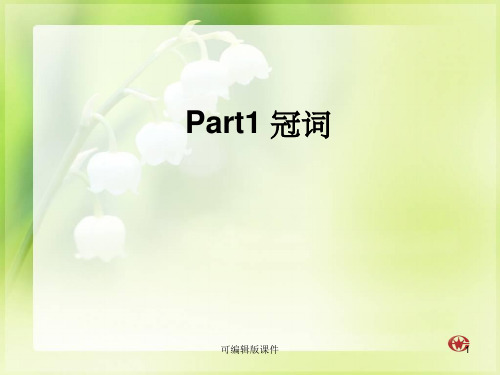
可编辑版课件
3
• 注意:“u” 虽是元音字母,但其发音可能 是/ju:/, 其中/j/ 是辅音,所以当以U开头的 单词,其发音是/ju:/的时候,只能用a,不能 用an. 如:
• a university student一个大学生。
• a useful way • 如果发音是元音的话,那就得用an.如:
可编辑版课件
12
不用冠词的情况
如果名词前已经有this, that, these, those, whose, which, my, your, their, his, her, its, some, every等一类词时, 就不能再加 冠词。 e.g.: That is his bike.那是他的自行车。 Whose is this car?这辆车是谁的?
• an unusual thing一件非同寻常的事
可编辑版课件
4
固定短语
• a lot of 许多 • a little 一点 • a good time 一段美好时光
可编辑版课件
5
• 不管是单数还是复数,只要是特指(即说 话双方心中都明白指的是哪个或哪些), 就用定冠词the.
• E.g.: This is a book. The book is very old. • What’s in the box? 盒子里装的是什么?
可编辑版课件
8
定冠词the用法
• 用于方向、方位的名词前。如: • The sun rises in the east.太阳从东方升起。 • There is a car in the middle of the road.路
中间有一辆车。
可编辑版课件
第二章 词汇 第2节 冠词(课件)通用版英语六年级下册
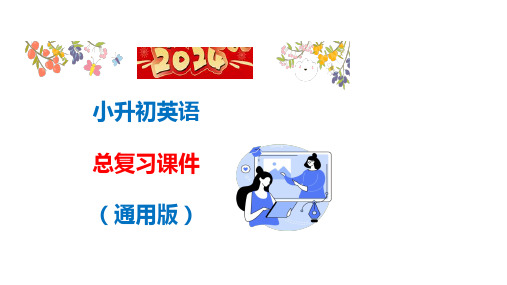
3.那位老人___th_e__o_ld__m_a_n______ 5.在一楼__o_n__th_e__fi_rs_t_f_l_o_o_r __
4.睡觉____g_o__to__b_e_d______ 6.格林一家__T_h_e_G__r_ee_n_s___
(7)国名、地名、人名等专有名词前不用冠词。如: Wuhan is a big city in China.武汉是中国的一个大城市。 (8)名词前如有某些限定词,如指示代词(this,that等)、形容 词性物主代词(my,your等)作定语时,不用冠词。如: This boy is very clever.这个男孩很聪明。
[点拨] 1.Great Wall意为“长城”,是世界上独一无二的事物。 2.特指“在那边的那个男孩”。 3.特指“这部电影”。 4.第一空表泛指,且 book 是以辅音音素开头的单词,用不定冠 词 a ;第二空特指前面提及的那本书,用定冠词 the。 5.在表示乐器的名词前要用定冠词 the。
对应训练
知识点1 不定冠词
不定冠词放在名词前面,主要用来泛指同类事物中的某一个。 不定冠词有a和an两种形式。a用于以辅音音素开头的单词前,an 用于以元音音素开头的单词前。
巧学妙记
不看字母看音素,不是原因(元音)别施恩(n)。以辅音音素开头 用a,以元音音素开头用an。
不定冠词的用法主要有以下几种: (1)相当于数量词 one,但语气不如 one 强烈。如: There is a bear and an elephant in the forest.森林里有一只熊和一 头大象。 (2)当第一次提到某人或某事物,非特指时,用不定冠词 a 或 an 起介绍作用。如: I met an old man on my way to school.我在去上学的路上碰到了 一位老人。
小学六年级英语复习课《冠词》精品教学课件
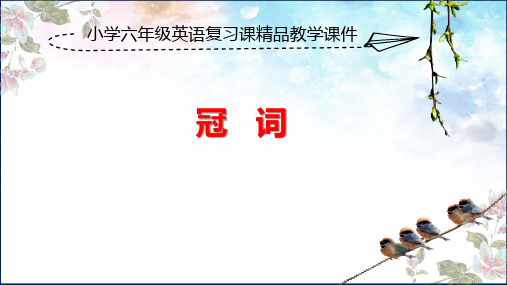
感谢聆听
(三)零冠词 零冠词指名词前不用冠词的情况。不用冠词的情况主要有以下几 种情况: 1.三餐和球类或棋类名称前。如: have lunch 吃午饭 have dinner吃晚饭 play football踢足球 play chess下棋
2.季节、月份、星期前。如: It is Autumn now.现在是秋天了。 My birthday is in May.我的生日在五月。 We usually go hiking on Saturday.周六我们通常去郊游。
2.不定冠词的基本用法
(二)定冠词 定冠词the用于名词前,通常有特指作用,表示“这个/这些,那 个/那些”。定冠词的用法主要有: 1.特指某(些)人或某(些)事物。如: The map on the wall is new.墙上的地图是新的。
2.指上文已经提到过的人或事物。如: I bought a book yesterday.The book is very good.昨天我买了本书。 那本书很好。
A.the
B.a
( )4.—Do you want ________ orange?
—No, I'd like ________ bottle of orange.
C.an
A.a; an
B.an; a
C.the; an
( )5.I like playing ________ football, but I don't like to play ________ piano.
Amy's father is in China.He works in 5.________ hospital. Amy is 6.________ good student.She often comes to school early and cleans 7.________ classroom.She studies hard at Chinese. On 8.________ weekends,we usually go to the cinema or play 9.________ games.Sometimes we spend our weekends on the beach.
小学英语冠词的用法-ppt课件

ppt课件
笔 记
6
不定冠词 a, an 的用法
• (4)在计量词前表示“每一”
• - How much is it? 。例如:
笔
记
• a lot of, a moment ago, a few, a little
学习冠词需要掌握以下4点
• 1.什么是冠词?有哪几个? • 2. 不定冠词的5种用法。 • 3. 定冠词的9种用法。 • 4. 免冠的3种情形。
ppt课件
1
冠词就是用在名词前,
冠 词
表示“个、一个”,
或者表示“这个、那个”的词,
分为:
不定冠词(a, an:个、一个)
定冠词(the:这个、那个)。
ppt课件
ppt课件
复习
11
定冠词The 的用法
复习
(5)用在形容词前表示一类人,the +形容词指的是一群人, 是一种复数含义,所以其后动词应用复数形式。例如:
The old are sick.
(6)用在姓名复数形式前表示一家人,动词用复数形式。
The Wangs have gone on holiday. (7)用于乐器名词前。 I can play the piano.
• China, • London, • Paris • Tian'anmen Square
ppt课件
16
2. 不可数名词前
Don't play with fire. We can‘t live without air.
ppt课件
17
3. 泛指的复数名词前:
Books are my best friend.
冠词ppt课件

01
例如,“The book on the table is mine.”(桌子上的书是我
的。)
指谈话双方都知道的人或事物
02
例如,“Close the window, please.”(请关上窗户。)
用于上文已提及的人或事物
03
例如,“He has a car. The car is red.”(他有一辆车。那辆
在某些情况下,冠词还可以改 变形容词或副词的词性,使其 具有名词的性质。
06
总结回顾与拓展延伸
关键知识点总结
冠词的定义和分类
冠词是虚词,用于名词前面,帮助说明名词所指 的人或事物。冠词可分为不定冠词、定冠词和零 冠词。
定冠词the的用法
定冠词表示特指,即指上文提到的人或事物,或 指谈话双方都清楚的人或事物。此外,定冠词还 可以用于表示世界上独一无二的事物、序数词和 形容词最高级前等。
在某些情况下,冠词 可以位于形容词或副 词前,修饰这些词。
对名词修饰作用
冠词可以表示名词的种类、范围 或程度。
通过使用不同的冠词,可以表达 名词的不同含义或情感色彩。
冠词还可以帮助区分同名异物或 同物异名的情况。
对形容词和副词修饰作用
冠词可以加强形容词或副词的 语气和程度。
使用特定的冠词可以使形容词 或副词的含义更加具体、明确 。
该书包含了丰富的冠词练习题,适合各个水平的学生进行练习。
《英语语法实战指南》
该书针对冠词的不同用法,提供了大量的实战练习题,帮助学生更 好地掌握冠词的用法。
《英语语法高分突破》
该书是一本针对英语考试的辅导书,其中包含了大量的冠词考点和 练习题,适合需要提高考试成绩的学生使用。
学习方法和技巧分享
六年级下册英语精品ppt-小升初英语语法汇总系列第4讲 冠词 人教PEP版PPT-完美版
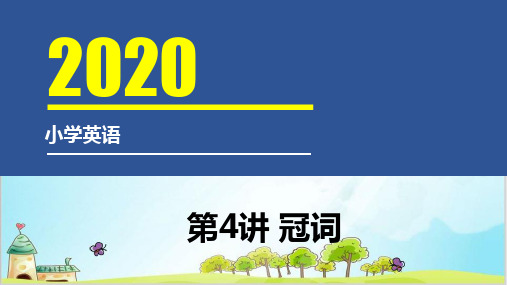
六年级下册英语精品课件-小升初英语 语法汇 总系列 第4讲 冠词 人教PEP版(优秀课件)
3
课堂运用
一、在下列名词前填上a或者an,不需要的地方划/
1.
English girl 2.
hot weather 3.
black pen
4.
clean park 5.
old hotel 6.
red skirt
小窍门:In a university, a European and a one-eyed man walk along a one- way road with a usual tool. This is a usual thing. (在一所大学里,有一个欧洲人和一个独眼龙拿着有用的工具沿着一条单行道行走,这是 件平常的事。)
2 双方都知道的人或事物
如:Open the door, please.
3 指上文提到的人或事物(第二次出现用定冠词the,第一次出现用不定冠词a 或an)
如:He lives on a farm, the farm is not big.
4 指世界上独一无二的事物前
如:The sun is bigger than the moon.
3)复数名词表示泛指。
如:Books are useful.
4)球类活动、学科名词、一日三餐前。
如:We have English and math every day
5)节日、星期、月份、季节名称前。
如:June 1 is Children’s Day.
6)表示颜色、语言、称呼语和官职、头衔的名词前。
二、单项选择
1. Do you like playing
tennis or
六年级ppt冠词名词课件

in spring 在春天
in June 在六月
in Shenyang 在沈阳
Mr.Wang 王先生
on the Mid-Autumn Day 在中秋节
选择正确的冠词填空:
冠词 (a/an/the)
1.I have _a_ book. 2._T_he cat can catch insect. 3.Lucy spends _a_n_ hour doing her
is _a_ beautiful umbrella in my bedroom. I like _th_e umbrella very much because I bought it in _/_
Paris. These are all my presents.
homework everyday.
4.Bob’s father isa_n_ engineer. 5.John is a__n honest boy. 6.A__n apple _a_ day keeps the doctor away.
7.Let’s have _a_ rest for. 8.Mother bought me _a_n umbrella yesterday. 9.I have _a_ pencil. T_h_e pencil is red. 10.T_h_e_sun is shining brightly in t_h_e sky. 11.T_h_e dictionary on _th_e desk is mine. 12.Is _/ Mary _th_e_youngest girl in our class. 13.Can you play _t_he__violin? 14.We go to school by _/__bike in_t_h_e morning every day.
专题二冠词(课件)人教PEP版英语六年级下册

类、语言等名词前。
speak English 说英语
by train 坐火车 与 by 连用的交通工具名词前。
by plane 乘飞机
在节日、星期、月份、季节 等名词前。
On Children’s Day 在儿童节 on Sunday 在星期日 in January 在一月 in winter 在冬季
买本英语书。
The car runs 100 kilometres an hour. 表示单位,有“每一”的意思。
这 辆 车 每 小 时 跑100 公里。
专题二 冠 词
2. 用于固定搭配的词组 a lot of 许多 have a good time 玩得开心 in a word 总而言之 have a look 看一下
专题二 冠 词
用法
示例
续表
表示数量“一”,相当
I have a mouth, a nose and two eyes.
于 one,但语气不如 one 强烈。 我有一张嘴、一个鼻子和两只眼睛。
用来指一类人或事物中的任何一 I want to buy an English book二 冠 词
■考点二 定 冠 词 1. the 的用法
用法
示例
用在特指的人或事物之前。 The woman is my mother.那位女士是我的妈妈。
用在上文提到的 人或事物之前。
This is my book. The book is in my bag. 这是我 的书。 这本书在我的包里。
在一些习惯短语中不用冠词。
at first 起初 go home 回家 in bed 卧床
小升初英语系统总复习
专题二 冠 词
冠词是一种虚词,常放在名词前面,帮助说明名词所指的人或 事物的含义。冠词本身不能单独使用,在句子中一般不重读。 冠词 分为不定冠词(a/ an)和定冠词(the)两种。
冠词(23张)ppt课件

冠词(23张)ppt课件•冠词概述•不定冠词•定冠词•零冠词•冠词的位置与省略•冠词与其他词类的关系01冠词概述定义与分类定义分类限定作用冠词可以限定名词所指的范围,避免歧义。
表述作用冠词可以表示名词的数量、特征或属性等。
连接作用冠词可以作为连接词,连接两个句子或短语。
不定冠词的用法定冠词的用法零冠词的用法03020102不定冠词01 02用于可数名词的单数形式前,表示泛指某人或某物。
例如:I have a book. 我有一本书。
用于表示数量、时间等概念的名词前,表示“每一”。
例如:We have three meals a day.我们一天吃三顿饭。
用于某些固定词组中。
例如:afew (一些),a little (一点),等等。
不定冠词的特殊用法用于序数词前,表示“又一”,“再一”。
例如I'll have to do it a second time. 我得再做一次。
用于某些专有名词前,表示“一个像……那样…He wants to be a Newton. 他想成为像牛顿那样的科学家。
用于某些抽象名词前,表示“一种……的情感…It was a pleasure to meet you. 见到你很高兴。
用于某些物质名词前,表示“一份/一杯/一…I'd like a coffee, please. 请给我来杯咖啡。
03定冠词单词形式:the缩写形式:'the(非正式场合)特指某人或某物用于独一无二的事物前用于形容词前表示一类人用于序数词和最高级前用于乐器前用于某些固定短语中用于姓氏的复数形式前表示一家人用于年代、朝代、时代前定冠词的特殊用法04零冠词不带任何冠词的名词形式省略冠词的情况01020304零冠词的特殊用法用于表示职位、头衔的名词前05冠词的位置与省略冠词的位置在某些情况下,冠词也可以放在形容词或分词短语前面,用来修饰后面的名词。
冠词的省略冠词省略的注意事项省略冠词不能影响句子的意思和语法正确性。
最新小学冠词用法PPT课件

一.流程
深井选择—人员配置—产品定位—渠道 选择—开发要求—称猪—算帐—料糟—低 温—直传—促销—工厂推介会—开发顺序 及期间—开发组长工作定位—实证员工作 定位—待遇与考核。
深井开发十二方针
深井不少于2千吨 一井至少两组人
产品哺乳420 新开直销两渠道 开发切记三铁律 称猪算帐做实证 优势体现配料糟 八项宣传把势造 新开促销三个月 一人一月一场会 工厂开会是首选 深挖至少六个月 十二方针是法宝 开发组员要记牢
保温
猪场保温“五个一工程” 一个猪洞(方便乳猪进出保温间,高≥26cm,宽≥18cm) 一把稻草(干净干燥,每三天换一次) 一把扫帚(清扫保温间) 一个灯泡(全天侯保温,产后6天内用250W,6天后100W) 一个编织袋(盖住保温间顶部,防止热气流失)
宣传
1、每月每人10本POP和10本养猪手册,组长30本,可 以一次领用三个月;
2、每人每月5条“哺乳母猪料”横幅; 3、每人每月50张“哺乳母猪料”单页和报纸50张; 4、每人配备一套摩托车喇叭和三角旗进行游动宣传;
5、前半年深井县每月做一期当地电视专题广告,每 期费用控制在2000元以内,后半年每隔一月做一期 当地电视专题广告,每期费用控制在2000元以内;
6、出了10户以上实证数据则编一期“用户使用效果荟 萃”,按照每个开发员200份印制;
1、哺乳母猪料价肉比 A:仔猪出生重1.6公斤,20日龄断奶8公斤,母猪从生产到仔
猪25日龄断奶用母猪料154公斤; B:仔猪25日龄净增重8-1.6=6.4公斤*10头=64公斤; C、料肉比:154/64=2.4,即2.4斤母猪料可长一斤仔猪; D、肉价比:2.4*1.425元=3.4元 即3.48元哺乳母猪料成本可长仔猪初生重和25日龄断奶 体重;
冠词部分(课件)人教PEP版英语六年级下册
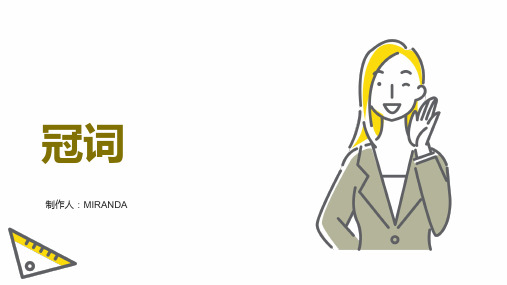
9)用于某些习惯用语中。 如:in the morning on the left in the end
by the way the day before yesterday
定冠词the用法歌诀: 特指双方熟悉,上文已经提起。 世上独一无二,方位名词乐器。 某些专有名词,还有复数姓氏。 序数词最高级,习惯用语要牢记。
如:the third day 第三天 the tallest boy 最高的男孩 The same colour 相同的颜色
5)用在表示世界上独一无二的事物的名词前。 如: The sun is shining.阳光明媚
The earth is round. 地球是圆的。
6)用在海洋、湖泊、海峡、山脉,方位等地理名词前。 如:the Yellow River 黄河
冠词
制作人:MIRANDA
冠词
概念: 放在名词前,说明名词所指的人或物,对名词 起限制作用的虚词叫做冠词。
冠词用法
1、不定冠词用法
1) a 用在以辅音音素开始的名词前;an用在以元音音素开 始的名词前。 如:an apple a bed
特殊情况 an hour an honest boy an (l, m, n, h, s,r, x) a useful book a university a uniform
2) 表示某类人或事物中的“一个”,但不强调数目概念,没 有one强烈。
如:I have a new bag.
3) 用于第一次提到的和泛指的单数可数名词前。 如:There is a book on the desk.
Do you have a ruler?
4) 用于某些固定词组中 如: have a good time a lot of have a look
最新PEP人教版小学英语六年级下册冠词优质教学课件
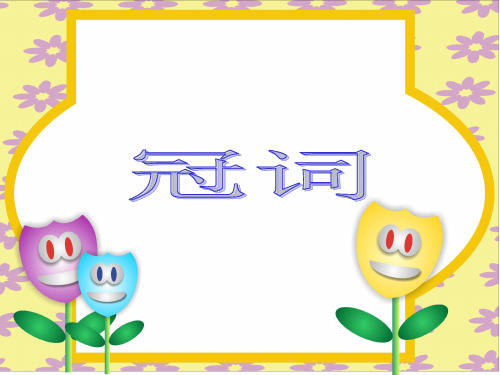
mother is having __ breakfast. My grandmother is watering __ flowers in __ garden and I’m watching __ TV. Look! This is my zone. There is __ beautiful umbrella in my bedroom. I like __ umbrella very much because I bought it in __ Paris. These are all my presents.
7.Let’s have __ rest for __ while. 8.Mother bought me __ uniform yesterday. 9.I have __ pencil __ (a, the) pencils is red. 10.___(a, the /) sun is shining brightly in __ (a, the, /) sky. 11.__ (a, the) dictionary on __ (a, the) desk is mine. 12.Is __ (the, /) Mary (a, the,/) youngest girl in our class. 13.Can you play (a, an, the, /) violin? 14.We go to school by (a, the, /) bike in (a, an, the) morning every day.
1.冠词有:a 、an 、the 定冠词:the
2.冠词分为:
不定冠词:a、an
冠词的用法:
• a/an 都表示一个 • an 用在单词发音中元音音标开头的单词 • a 用在单词发音中辅音音标开头的单词 • a/an 第一次提到 • the 再次提到
英语冠词的用法大全ppt课件

从使用情况来看,闭胸式的使用比较 广泛。 敞开式 盾构之 中有挤 压式盾 构、全 部敞开 式盾构 ,但在 近些年 的城市 地下工 程施工 中已很 少使用 ,在此 不再说 明。
2
不定冠词的用法
不定冠词a (an)与数词one 同源,是“一个”的意思。a用于 辅音音素前,一般读作[e],而an则用于元音音素前,一般 读做[en]。
从使用情况来看,闭胸式的使用比较 广泛。 敞开式 盾构之 中有挤 压式盾 构、全 部敞开 式盾构 ,但在 近些年 的城市 地下工 程施工 中已很 少使用 ,在此 不再说 明。
比较“a”和“an”的不同用法 a用于发音以辅音开头的词前,an用于发音以元音开头的词前:
a university student 一个大学生 an umbrella 一把雨伞
从使用情况来看,闭胸式的使用比较 广泛。 敞开式 盾构之 中有挤 压式盾 构、全 部敞开 式盾构 ,但在 近些年 的城市 地下工 程施工 中已很 少使用 ,在此 不再说 明。
5
冠词用法歌诀
名词是秃子,常要戴帽子。可数名词单,须用a或an。 辅音前用a,an用元音前。若为特指时,则须用定冠。 复数不可数,泛指the不见。碰到代词时,冠词均不现。
从使用情况来看,闭胸式的使用比较 广泛。 敞开式 盾构之 中有挤 压式盾 构、全 部敞开 式盾构 ,但在 近些年 的城市 地下工 程施工 中已很 少使用 ,在此 不再说 明。
从使用情况来看,闭胸式的使用比较 广泛。 敞开式 盾构之 中有挤 压式盾 构、全 部敞开 式盾构 ,但在 近些年 的城市 地下工 程施工 中已很 少使用 ,在此 不再说 明。
1
冠词及冠词的用法
冠词是虚词,本身不能单独使用,也没有词义,它用在 名词的前面,帮助指明名词的含义。英语中的冠词有三 种,一种是定冠词(the Definite Article),另一种是 不定冠词(the Indefinite Article),还有一种是零冠词 (Zero Article)。
- 1、下载文档前请自行甄别文档内容的完整性,平台不提供额外的编辑、内容补充、找答案等附加服务。
- 2、"仅部分预览"的文档,不可在线预览部分如存在完整性等问题,可反馈申请退款(可完整预览的文档不适用该条件!)。
- 3、如文档侵犯您的权益,请联系客服反馈,我们会尽快为您处理(人工客服工作时间:9:00-18:30)。
一家正准备去看电影。 • 与某些形容词连用,表一类人或物。如: • the old 老人 the young年轻人 • the rich 富人 the poor 穷人 the blind 盲人
.
听力口语练习
• If you are a teacher, are you sure that a student with good grades will be a successful person in the future? And are you sure that a slow student will be also slow in his whole life? I’m not sure about it, absolutely not. I had a student and all the teachers agreed that he was absolutely the slowest student we had ever had. He spoke slowly, moved slowly, and wrote slowly. We suspected that he thought slowly. But he could proudly add the title of “doctor” to his name in six years. So I believe one sentence for ever, “If at first you don’t succeed, try, try again”. Yes, I’m sure about this, you may also remember it.
.
固定短语
• a lot of 许多 • a little 一点 • a good time 一段美好时光
.
• 不管是单数还是复数,只要是特指(即说 话双方心中都明白指的是哪个或哪些), 就用定冠词the.
• E.g.: This is a book. The book is very old. • What’s in the box? 盒子里装的是什么?
.
定冠词the用法
• 固定搭配: • In the morning在早晨 • all over the world全世界 • go to the cinema去看电影 • in the end最后 • at the age of…在……岁的时候
.
不用冠词的情况
• 在不可数名词前不使用冠词。如: • Where there is life, there is hope.有生命就
.
定冠词the用法
• 用于方向、方位的名词前。如: • The sun rises in the east.太阳从东方升起。 • There is a car in the middle of the road.路
中间有一辆车。
.
定冠词the用法
• 用在姓氏复数前,表示“某某一家人” 或 “某某夫妇”。如:
有希望。 • 在某些专有名词前不用冠词。如国家、人
名、地名: Wuhan is a big city in China. China is bigger than Britain.中国比英国大。 Mr. Brown is very kind.
.
不用冠词的情况
如果名词前已经有this, that, these, those, whose, which, my, your, their, his, her, its, some, every等一类词时, 就不能再加 冠词。 e.g.: That is his bike.那是他的自行车。 Whose is this car?这辆车是谁的?
在一个民族独有的节日前,往往要加the, 如: the Spring Festival春节 the M.id-Autumn Festival中秋节
不用冠词的情况
• 在球类、学科和三餐的名词前不用冠词。如: • We often play basketball or learn Chinese after
“physics”.
.
• 注意:“u” 虽是元音字母,但其发音可能 是/ju:/, 其中/j/ 是辅音,所以当以U开头的 单词,其发音是/ju:/的时候,只能用a,不能 用an. 如:
• a university student一个大学生。 • a useful way • 如果发音是元音的话,那就得用an.如: • an unusual thing一件非同寻常的事
breakfast.早饭后,我们经常打篮球或学汉语。 • 固定短语: • go to school去上学 go to bed上床睡觉 • at home在家 at night 在夜里/晚上 • go for lunch去吃午饭 • in the hospital在医院里
如果三餐前有形容词修饰,也可以加冠词。如: a delicious dinner一顿美味的晚餐。
.
不用冠词的情况
• 在四季、月份、星期等的名词前不用冠词。如: • Tomorrow is Sunday. • Summer is hot. • Spring comes after winter.冬去春来。 • 在表示交通手段的介词短语中和在公共节日、假日
名称前不用冠词。如: • Do you go by train or by ship? • New Year’s Day新年/元旦 Christmas Day圣诞节 • National Day国庆节
Part1 冠词
.
• 冠词art. : 不定冠词a/an, 定冠词the, 玲冠名词所指 的人或事物,也可用来泛指某一类人或事 物中的任何一个。
• a/an用来修饰单数可数名词,a用于辅音前 (这里是指发音,不是指字母。),an用 于元音前(指发音,半元音视为辅音)。
.
very useful.
.
定冠词the用法
• 用于序数词、形容词的最高级等修饰的名 词前。如:
• The first lesson is about how to go to school.
• Amy is the best student in our class. • 用于西方乐器的名词前。如: • Ann is playing violin.安正在拉小提琴。 • I like playing the piano.我喜欢弹钢琴
.
定冠词the用法
• 用于世界上独一无二的事物前,如: • The sun is shining.阳光明媚。 • The earth moves around the sun.地球绕着
太阳转。 • 用于上文已提到的人或实物,如: • He has a new pen. The pen is very nice. • There is a book on the desk. The book is
• E.g.: one, hour, unit, honor, useful…
不见元音,不施恩(n)。
.
• A horse is_____ useful animal. • He tells me______ ugly news. • Mary is ______ honest girl. • Today is _____ hot day. • He gives me _____ old stamp. • He is ____ one-eyed man. • There is ____ “h” in the word “hotel”. • There is _____ “P” in the word
.
听力口语练习
• 如果你是个老师,你确信成绩好的学生将 来就会成功吗?你确信那些差生一生都会 差吗?我不能确定,绝对不能。我有一个 学生,所有的老师都觉得他他们所见过的 最差的学生。他说话慢,走路慢,写字也 慢。我们怀疑他的思维也慢,但是六年以 后,他骄傲地把“博士”的头衔加在了他 的名字之前。因而我只信一句话“如果一 开始你没有成功,努力,再努力”。我相 信这一点,你们也应该记住这一点。
